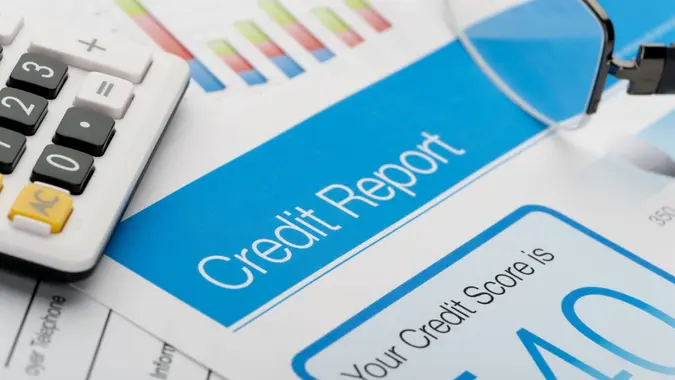One Common Credit Mistake That Damages Your Score

Commitment to Our Readers
GOBankingRates' editorial team is committed to bringing you unbiased reviews and information. We use data-driven methodologies to evaluate financial products and services - our reviews and ratings are not influenced by advertisers. You can read more about our editorial guidelines and our products and services review methodology.

20 Years
Helping You Live Richer

Reviewed
by Experts

Trusted by
Millions of Readers
Your credit score affects major parts of your life — from the kind of car you drive to where you live. You know this already. So you’re doing everything you can to improve your credit, starting with learning about the habits that can make or break your score.
While there are many factors to consider, being late on payments is arguably the top detriment to your credit score.
There’s data to prove it. A poor payment history is one of the biggest contributors to a low FICO® Score — one of the most widely used types of credit scores. FICO is based on five key factors: Payment history, amounts owed, length of credit history, credit mix and new credit. Of those, payment history carries the most weight, accounting for 35% of your score.
GOBankingRates looked into why falling behind on payments can hurt so much — and what you can do to fix it.
How Late Payments Hurt Your Score
Writing for MyFICO, Michelle Black offered a blunt assessment: “Paying late is one of the worst credit management habits you can develop.”
Because payment history makes up 35% of your FICO Score, even one late payment can seriously drag it down. And the damage gets worse the longer you delay. Payments that are 60 or 90 days overdue carry a heavier penalty than a single 30-day slip.
As if that weren’t bad enough, late payments can stay on your credit report for up to seven years, Black said.
Understanding How It Happens
Anyone can fall behind on a payment. A sudden job loss, health issue or other emergency can take a toll on your finances — making it difficult to stay on top of bills.
But if you’re falling behind and there’s no major life event to blame, it may be time to reassess your budget and financial priorities. For instance, if payday comes just after your student loan is due, you might miss the deadline without meaning to. Or you could be unconsciously prioritizing fun expenses like dining out over credit card payments.
Once you’re in debt, it can be tempting to ignore it, assuming things can’t get worse. But they can. Creditors usually report late payments in intervals — 30, 60, 90 days and beyond — with each threshold hurting your score more than the last.
Fixing the Problem
The good news? It’s possible to recover from late payments and prevent them from wrecking your credit.
If you’re facing circumstances beyond your control, consider calling your lenders. You might be surprised how willing they are to work with you — especially if you usually pay on time. Some may offer to adjust your due date, reduce your interest rate or offer a short-term hardship plan.
You should also review your budget to make sure you can make payments on time. That might mean cutting back on extras like streaming services or nights out. A side hustle could also provide extra cash to stay on track. If forgetfulness is your issue — and that’s perfectly understandable — automating your payments is a simple and effective solution.
Bottom Line
Getting behind on payments is one of the most damaging things you can do to your credit score. Because payment history plays such a big role in your FICO Score, it’s crucial to understand why you’re falling behind — and take steps to change it.
 Written by
Written by  Edited by
Edited by 























